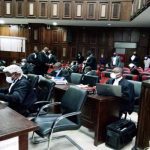A Lagos Federal High Court, has fixed April 20, 2023, to rule on Kogi State’s application seeking to vacate an interim order of court freezing 14 properties linked to the Kogi State governor.
Justice Nicholas Oweibo fixed the date after taking submissions from the Governor’s counsel, Abdulwahab Mohammed (SAN) and the Economic and Financial Crimes Commission Counsel, Mr Rotimi Oyedopo (SAN).
Justice Oweibo had on February 22, made an interim forfeiture order following an exparte motion to seize 14 properties and firms in Lagos, Abuja, and the United Arab Emirates as well as N400 million, recovered from one Aminu Falala.
At the resumed hearing of the matter, the Kogi State government’s counsel told the court that the EFCC’s actions are in continued disobedience of a subsisting order of the Kogi State High Court which restrained it from taking any step against the Kogi State Government, including its employees, appointees or associates.
Mr Mohammed (SAN) stated that at about the third quarter of 2021, EFCC approached the court to freeze Kogi State’s N20bn salary bailout loan that was allegedly hidden in Sterling Bank.
He said that when the Kogi State Government called Sterling Bank, the bank denied that such account existed, and that they challenged the freezing order made by Justice Tijjani Ringim insisting the order was obtained illegally.
Mr Mohammed added that EFCC, instead of apologising, sent a press release that the money had been returned to the Central Bank of Nigeria (CBN).
According to him, the Kogi State Government approached the state High Court, presided over by the present Chief Judge, Justice Josiah Majebi, who granted an order restraining the EFCC from having anything to do with Kogi State until the substantive matter was determined.
He argued that the order of the Kogi State High Court restraining EFCC from taking any step against the state government was still subsisting.
“The EFCC in flagrant disregard of the said Order of the Kogi State High Court and her pending appeal at the Court of Appeal Abuja Judicial Division, arrested one Ali Bello, Nephew of the Applicant herein, who is an associate of the Kogi State Government on the 29th of November, 2022.
“That the EFCC in flagrant disobedience of the subsisting Order of the High Court of Kogi State, interrogated the said Ali Bello and coerced him to oblige them information pertaining to most of the properties listed in the Order of this Honourable Court made on the 22nd of February, 2023.
“That the said Ali Bello aggrieved by his illegal arrest and forced interrogation, filed a fundamental rights enforcement application at the High Court of Kogi State, Lokoja Judicial Division against the EFCC in Suit No: HCL/696″/2022: Ali Bello V. The Economic and Financial Crimes Commission (EFCC) & Anor.
“That the High Court of Kogi State in a Judgement delivered on the 12th of January, 2023 granted all the reliefs sought by the Applicant and made an Order declaring his arrest, detention and interrogation illegal and unconstitutional and further order of perpetual injunction restraining the Economic and Financial Crimes Commission, their agents, servants, privies or howsoever called from further arrest, detention, harassment and intimidation of the said Ali Bello, nephew of the Applicant herein.
“That the Economic and Financial Crimes Commission in continuous disobedience of the extant Orders of Court barring it from inviting or doing anything with respect to the affairs of the Kogi State Government and its officials, brought the instant application for preservation order of properties they alleged are reasonably suspected to have been derived from unlawful activity stemming from the purported misappropriation of funds belong to Kogi State Government.
“That the Application filed by the EFCC on the 20th of February, 2023 upon which this Honourable Court made the order dated 22 February, 2023, sought to be vacated herein, is a continuous disobedience of subsisting Orders of Courts of coordinate jurisdiction, that had restrained the Economic and Financial Crimes Commission from doing anything with respect to the affairs of the Applicant including the employees, appointees or associates of Kogi State Government,” he said.
Mr Mohammed argued that in a federation, the EFCC lacked the power to dictate to a state how it spends money.
Counsel to the EFCC, Oyedepo, in his response, said the applicant had brought nothing before the court to convince the court to vacate the order.
He urged the court to dismiss the application of the applicant seeking to vacate the order earlier made by the court.
A Lagos Federal High Court, has fixed April 20, 2023, to rule on Kogi State’s application seeking to vacate an interim order of court freezing 14 properties linked to the Kogi State governor.
Justice Nicholas Oweibo fixed the date after taking submissions from the Governor’s counsel, Abdulwahab Mohammed (SAN) and the Economic and Financial Crimes Commission Counsel, Mr Rotimi Oyedopo (SAN).
Justice Oweibo had on February 22, made an interim forfeiture order following an exparte motion to seize 14 properties and firms in Lagos, Abuja, and the United Arab Emirates as well as N400 million, recovered from one Aminu Falala.
At the resumed hearing of the matter, the Kogi State government’s counsel told the court that the EFCC’s actions are in continued disobedience of a subsisting order of the Kogi State High Court which restrained it from taking any step against the Kogi State Government, including its employees, appointees or associates.
Mr Mohammed (SAN) stated that at about the third quarter of 2021, EFCC approached the court to freeze Kogi State’s N20bn salary bailout loan that was allegedly hidden in Sterling Bank.
He said that when the Kogi State Government called Sterling Bank, the bank denied that such account existed, and that they challenged the freezing order made by Justice Tijjani Ringim insisting the order was obtained illegally.
Mr Mohammed added that EFCC, instead of apologising, sent a press release that the money had been returned to the Central Bank of Nigeria (CBN).
According to him, the Kogi State Government approached the state High Court, presided over by the present Chief Judge, Justice Josiah Majebi, who granted an order restraining the EFCC from having anything to do with Kogi State until the substantive matter was determined.
He argued that the order of the Kogi State High Court restraining EFCC from taking any step against the state government was still subsisting.
“The EFCC in flagrant disregard of the said Order of the Kogi State High Court and her pending appeal at the Court of Appeal Abuja Judicial Division, arrested one Ali Bello, Nephew of the Applicant herein, who is an associate of the Kogi State Government on the 29th of November, 2022.
“That the EFCC in flagrant disobedience of the subsisting Order of the High Court of Kogi State, interrogated the said Ali Bello and coerced him to oblige them information pertaining to most of the properties listed in the Order of this Honourable Court made on the 22nd of February, 2023.
“That the said Ali Bello aggrieved by his illegal arrest and forced interrogation, filed a fundamental rights enforcement application at the High Court of Kogi State, Lokoja Judicial Division against the EFCC in Suit No: HCL/696″/2022: Ali Bello V. The Economic and Financial Crimes Commission (EFCC) & Anor.
“That the High Court of Kogi State in a Judgement delivered on the 12th of January, 2023 granted all the reliefs sought by the Applicant and made an Order declaring his arrest, detention and interrogation illegal and unconstitutional and further order of perpetual injunction restraining the Economic and Financial Crimes Commission, their agents, servants, privies or howsoever called from further arrest, detention, harassment and intimidation of the said Ali Bello, nephew of the Applicant herein.
“That the Economic and Financial Crimes Commission in continuous disobedience of the extant Orders of Court barring it from inviting or doing anything with respect to the affairs of the Kogi State Government and its officials, brought the instant application for preservation order of properties they alleged are reasonably suspected to have been derived from unlawful activity stemming from the purported misappropriation of funds belong to Kogi State Government.
“That the Application filed by the EFCC on the 20th of February, 2023 upon which this Honourable Court made the order dated 22 February, 2023, sought to be vacated herein, is a continuous disobedience of subsisting Orders of Courts of coordinate jurisdiction, that had restrained the Economic and Financial Crimes Commission from doing anything with respect to the affairs of the Applicant including the employees, appointees or associates of Kogi State Government,” he said.
Mr Mohammed argued that in a federation, the EFCC lacked the power to dictate to a state how it spends money.
Counsel to the EFCC, Oyedepo, in his response, said the applicant had brought nothing before the court to convince the court to vacate the order.
He urged the court to dismiss the application of the applicant seeking to vacate the order earlier made by the court.
A Lagos Federal High Court, has fixed April 20, 2023, to rule on Kogi State’s application seeking to vacate an interim order of court freezing 14 properties linked to the Kogi State governor.
Justice Nicholas Oweibo fixed the date after taking submissions from the Governor’s counsel, Abdulwahab Mohammed (SAN) and the Economic and Financial Crimes Commission Counsel, Mr Rotimi Oyedopo (SAN).
Justice Oweibo had on February 22, made an interim forfeiture order following an exparte motion to seize 14 properties and firms in Lagos, Abuja, and the United Arab Emirates as well as N400 million, recovered from one Aminu Falala.
At the resumed hearing of the matter, the Kogi State government’s counsel told the court that the EFCC’s actions are in continued disobedience of a subsisting order of the Kogi State High Court which restrained it from taking any step against the Kogi State Government, including its employees, appointees or associates.
Mr Mohammed (SAN) stated that at about the third quarter of 2021, EFCC approached the court to freeze Kogi State’s N20bn salary bailout loan that was allegedly hidden in Sterling Bank.
He said that when the Kogi State Government called Sterling Bank, the bank denied that such account existed, and that they challenged the freezing order made by Justice Tijjani Ringim insisting the order was obtained illegally.
Mr Mohammed added that EFCC, instead of apologising, sent a press release that the money had been returned to the Central Bank of Nigeria (CBN).
According to him, the Kogi State Government approached the state High Court, presided over by the present Chief Judge, Justice Josiah Majebi, who granted an order restraining the EFCC from having anything to do with Kogi State until the substantive matter was determined.
He argued that the order of the Kogi State High Court restraining EFCC from taking any step against the state government was still subsisting.
“The EFCC in flagrant disregard of the said Order of the Kogi State High Court and her pending appeal at the Court of Appeal Abuja Judicial Division, arrested one Ali Bello, Nephew of the Applicant herein, who is an associate of the Kogi State Government on the 29th of November, 2022.
“That the EFCC in flagrant disobedience of the subsisting Order of the High Court of Kogi State, interrogated the said Ali Bello and coerced him to oblige them information pertaining to most of the properties listed in the Order of this Honourable Court made on the 22nd of February, 2023.
“That the said Ali Bello aggrieved by his illegal arrest and forced interrogation, filed a fundamental rights enforcement application at the High Court of Kogi State, Lokoja Judicial Division against the EFCC in Suit No: HCL/696″/2022: Ali Bello V. The Economic and Financial Crimes Commission (EFCC) & Anor.
“That the High Court of Kogi State in a Judgement delivered on the 12th of January, 2023 granted all the reliefs sought by the Applicant and made an Order declaring his arrest, detention and interrogation illegal and unconstitutional and further order of perpetual injunction restraining the Economic and Financial Crimes Commission, their agents, servants, privies or howsoever called from further arrest, detention, harassment and intimidation of the said Ali Bello, nephew of the Applicant herein.
“That the Economic and Financial Crimes Commission in continuous disobedience of the extant Orders of Court barring it from inviting or doing anything with respect to the affairs of the Kogi State Government and its officials, brought the instant application for preservation order of properties they alleged are reasonably suspected to have been derived from unlawful activity stemming from the purported misappropriation of funds belong to Kogi State Government.
“That the Application filed by the EFCC on the 20th of February, 2023 upon which this Honourable Court made the order dated 22 February, 2023, sought to be vacated herein, is a continuous disobedience of subsisting Orders of Courts of coordinate jurisdiction, that had restrained the Economic and Financial Crimes Commission from doing anything with respect to the affairs of the Applicant including the employees, appointees or associates of Kogi State Government,” he said.
Mr Mohammed argued that in a federation, the EFCC lacked the power to dictate to a state how it spends money.
Counsel to the EFCC, Oyedepo, in his response, said the applicant had brought nothing before the court to convince the court to vacate the order.
He urged the court to dismiss the application of the applicant seeking to vacate the order earlier made by the court.
A Lagos Federal High Court, has fixed April 20, 2023, to rule on Kogi State’s application seeking to vacate an interim order of court freezing 14 properties linked to the Kogi State governor.
Justice Nicholas Oweibo fixed the date after taking submissions from the Governor’s counsel, Abdulwahab Mohammed (SAN) and the Economic and Financial Crimes Commission Counsel, Mr Rotimi Oyedopo (SAN).
Justice Oweibo had on February 22, made an interim forfeiture order following an exparte motion to seize 14 properties and firms in Lagos, Abuja, and the United Arab Emirates as well as N400 million, recovered from one Aminu Falala.
At the resumed hearing of the matter, the Kogi State government’s counsel told the court that the EFCC’s actions are in continued disobedience of a subsisting order of the Kogi State High Court which restrained it from taking any step against the Kogi State Government, including its employees, appointees or associates.
Mr Mohammed (SAN) stated that at about the third quarter of 2021, EFCC approached the court to freeze Kogi State’s N20bn salary bailout loan that was allegedly hidden in Sterling Bank.
He said that when the Kogi State Government called Sterling Bank, the bank denied that such account existed, and that they challenged the freezing order made by Justice Tijjani Ringim insisting the order was obtained illegally.
Mr Mohammed added that EFCC, instead of apologising, sent a press release that the money had been returned to the Central Bank of Nigeria (CBN).
According to him, the Kogi State Government approached the state High Court, presided over by the present Chief Judge, Justice Josiah Majebi, who granted an order restraining the EFCC from having anything to do with Kogi State until the substantive matter was determined.
He argued that the order of the Kogi State High Court restraining EFCC from taking any step against the state government was still subsisting.
“The EFCC in flagrant disregard of the said Order of the Kogi State High Court and her pending appeal at the Court of Appeal Abuja Judicial Division, arrested one Ali Bello, Nephew of the Applicant herein, who is an associate of the Kogi State Government on the 29th of November, 2022.
“That the EFCC in flagrant disobedience of the subsisting Order of the High Court of Kogi State, interrogated the said Ali Bello and coerced him to oblige them information pertaining to most of the properties listed in the Order of this Honourable Court made on the 22nd of February, 2023.
“That the said Ali Bello aggrieved by his illegal arrest and forced interrogation, filed a fundamental rights enforcement application at the High Court of Kogi State, Lokoja Judicial Division against the EFCC in Suit No: HCL/696″/2022: Ali Bello V. The Economic and Financial Crimes Commission (EFCC) & Anor.
“That the High Court of Kogi State in a Judgement delivered on the 12th of January, 2023 granted all the reliefs sought by the Applicant and made an Order declaring his arrest, detention and interrogation illegal and unconstitutional and further order of perpetual injunction restraining the Economic and Financial Crimes Commission, their agents, servants, privies or howsoever called from further arrest, detention, harassment and intimidation of the said Ali Bello, nephew of the Applicant herein.
“That the Economic and Financial Crimes Commission in continuous disobedience of the extant Orders of Court barring it from inviting or doing anything with respect to the affairs of the Kogi State Government and its officials, brought the instant application for preservation order of properties they alleged are reasonably suspected to have been derived from unlawful activity stemming from the purported misappropriation of funds belong to Kogi State Government.
“That the Application filed by the EFCC on the 20th of February, 2023 upon which this Honourable Court made the order dated 22 February, 2023, sought to be vacated herein, is a continuous disobedience of subsisting Orders of Courts of coordinate jurisdiction, that had restrained the Economic and Financial Crimes Commission from doing anything with respect to the affairs of the Applicant including the employees, appointees or associates of Kogi State Government,” he said.
Mr Mohammed argued that in a federation, the EFCC lacked the power to dictate to a state how it spends money.
Counsel to the EFCC, Oyedepo, in his response, said the applicant had brought nothing before the court to convince the court to vacate the order.
He urged the court to dismiss the application of the applicant seeking to vacate the order earlier made by the court.
A Lagos Federal High Court, has fixed April 20, 2023, to rule on Kogi State’s application seeking to vacate an interim order of court freezing 14 properties linked to the Kogi State governor.
Justice Nicholas Oweibo fixed the date after taking submissions from the Governor’s counsel, Abdulwahab Mohammed (SAN) and the Economic and Financial Crimes Commission Counsel, Mr Rotimi Oyedopo (SAN).
Justice Oweibo had on February 22, made an interim forfeiture order following an exparte motion to seize 14 properties and firms in Lagos, Abuja, and the United Arab Emirates as well as N400 million, recovered from one Aminu Falala.
At the resumed hearing of the matter, the Kogi State government’s counsel told the court that the EFCC’s actions are in continued disobedience of a subsisting order of the Kogi State High Court which restrained it from taking any step against the Kogi State Government, including its employees, appointees or associates.
Mr Mohammed (SAN) stated that at about the third quarter of 2021, EFCC approached the court to freeze Kogi State’s N20bn salary bailout loan that was allegedly hidden in Sterling Bank.
He said that when the Kogi State Government called Sterling Bank, the bank denied that such account existed, and that they challenged the freezing order made by Justice Tijjani Ringim insisting the order was obtained illegally.
Mr Mohammed added that EFCC, instead of apologising, sent a press release that the money had been returned to the Central Bank of Nigeria (CBN).
According to him, the Kogi State Government approached the state High Court, presided over by the present Chief Judge, Justice Josiah Majebi, who granted an order restraining the EFCC from having anything to do with Kogi State until the substantive matter was determined.
He argued that the order of the Kogi State High Court restraining EFCC from taking any step against the state government was still subsisting.
“The EFCC in flagrant disregard of the said Order of the Kogi State High Court and her pending appeal at the Court of Appeal Abuja Judicial Division, arrested one Ali Bello, Nephew of the Applicant herein, who is an associate of the Kogi State Government on the 29th of November, 2022.
“That the EFCC in flagrant disobedience of the subsisting Order of the High Court of Kogi State, interrogated the said Ali Bello and coerced him to oblige them information pertaining to most of the properties listed in the Order of this Honourable Court made on the 22nd of February, 2023.
“That the said Ali Bello aggrieved by his illegal arrest and forced interrogation, filed a fundamental rights enforcement application at the High Court of Kogi State, Lokoja Judicial Division against the EFCC in Suit No: HCL/696″/2022: Ali Bello V. The Economic and Financial Crimes Commission (EFCC) & Anor.
“That the High Court of Kogi State in a Judgement delivered on the 12th of January, 2023 granted all the reliefs sought by the Applicant and made an Order declaring his arrest, detention and interrogation illegal and unconstitutional and further order of perpetual injunction restraining the Economic and Financial Crimes Commission, their agents, servants, privies or howsoever called from further arrest, detention, harassment and intimidation of the said Ali Bello, nephew of the Applicant herein.
“That the Economic and Financial Crimes Commission in continuous disobedience of the extant Orders of Court barring it from inviting or doing anything with respect to the affairs of the Kogi State Government and its officials, brought the instant application for preservation order of properties they alleged are reasonably suspected to have been derived from unlawful activity stemming from the purported misappropriation of funds belong to Kogi State Government.
“That the Application filed by the EFCC on the 20th of February, 2023 upon which this Honourable Court made the order dated 22 February, 2023, sought to be vacated herein, is a continuous disobedience of subsisting Orders of Courts of coordinate jurisdiction, that had restrained the Economic and Financial Crimes Commission from doing anything with respect to the affairs of the Applicant including the employees, appointees or associates of Kogi State Government,” he said.
Mr Mohammed argued that in a federation, the EFCC lacked the power to dictate to a state how it spends money.
Counsel to the EFCC, Oyedepo, in his response, said the applicant had brought nothing before the court to convince the court to vacate the order.
He urged the court to dismiss the application of the applicant seeking to vacate the order earlier made by the court.
A Lagos Federal High Court, has fixed April 20, 2023, to rule on Kogi State’s application seeking to vacate an interim order of court freezing 14 properties linked to the Kogi State governor.
Justice Nicholas Oweibo fixed the date after taking submissions from the Governor’s counsel, Abdulwahab Mohammed (SAN) and the Economic and Financial Crimes Commission Counsel, Mr Rotimi Oyedopo (SAN).
Justice Oweibo had on February 22, made an interim forfeiture order following an exparte motion to seize 14 properties and firms in Lagos, Abuja, and the United Arab Emirates as well as N400 million, recovered from one Aminu Falala.
At the resumed hearing of the matter, the Kogi State government’s counsel told the court that the EFCC’s actions are in continued disobedience of a subsisting order of the Kogi State High Court which restrained it from taking any step against the Kogi State Government, including its employees, appointees or associates.
Mr Mohammed (SAN) stated that at about the third quarter of 2021, EFCC approached the court to freeze Kogi State’s N20bn salary bailout loan that was allegedly hidden in Sterling Bank.
He said that when the Kogi State Government called Sterling Bank, the bank denied that such account existed, and that they challenged the freezing order made by Justice Tijjani Ringim insisting the order was obtained illegally.
Mr Mohammed added that EFCC, instead of apologising, sent a press release that the money had been returned to the Central Bank of Nigeria (CBN).
According to him, the Kogi State Government approached the state High Court, presided over by the present Chief Judge, Justice Josiah Majebi, who granted an order restraining the EFCC from having anything to do with Kogi State until the substantive matter was determined.
He argued that the order of the Kogi State High Court restraining EFCC from taking any step against the state government was still subsisting.
“The EFCC in flagrant disregard of the said Order of the Kogi State High Court and her pending appeal at the Court of Appeal Abuja Judicial Division, arrested one Ali Bello, Nephew of the Applicant herein, who is an associate of the Kogi State Government on the 29th of November, 2022.
“That the EFCC in flagrant disobedience of the subsisting Order of the High Court of Kogi State, interrogated the said Ali Bello and coerced him to oblige them information pertaining to most of the properties listed in the Order of this Honourable Court made on the 22nd of February, 2023.
“That the said Ali Bello aggrieved by his illegal arrest and forced interrogation, filed a fundamental rights enforcement application at the High Court of Kogi State, Lokoja Judicial Division against the EFCC in Suit No: HCL/696″/2022: Ali Bello V. The Economic and Financial Crimes Commission (EFCC) & Anor.
“That the High Court of Kogi State in a Judgement delivered on the 12th of January, 2023 granted all the reliefs sought by the Applicant and made an Order declaring his arrest, detention and interrogation illegal and unconstitutional and further order of perpetual injunction restraining the Economic and Financial Crimes Commission, their agents, servants, privies or howsoever called from further arrest, detention, harassment and intimidation of the said Ali Bello, nephew of the Applicant herein.
“That the Economic and Financial Crimes Commission in continuous disobedience of the extant Orders of Court barring it from inviting or doing anything with respect to the affairs of the Kogi State Government and its officials, brought the instant application for preservation order of properties they alleged are reasonably suspected to have been derived from unlawful activity stemming from the purported misappropriation of funds belong to Kogi State Government.
“That the Application filed by the EFCC on the 20th of February, 2023 upon which this Honourable Court made the order dated 22 February, 2023, sought to be vacated herein, is a continuous disobedience of subsisting Orders of Courts of coordinate jurisdiction, that had restrained the Economic and Financial Crimes Commission from doing anything with respect to the affairs of the Applicant including the employees, appointees or associates of Kogi State Government,” he said.
Mr Mohammed argued that in a federation, the EFCC lacked the power to dictate to a state how it spends money.
Counsel to the EFCC, Oyedepo, in his response, said the applicant had brought nothing before the court to convince the court to vacate the order.
He urged the court to dismiss the application of the applicant seeking to vacate the order earlier made by the court.
A Lagos Federal High Court, has fixed April 20, 2023, to rule on Kogi State’s application seeking to vacate an interim order of court freezing 14 properties linked to the Kogi State governor.
Justice Nicholas Oweibo fixed the date after taking submissions from the Governor’s counsel, Abdulwahab Mohammed (SAN) and the Economic and Financial Crimes Commission Counsel, Mr Rotimi Oyedopo (SAN).
Justice Oweibo had on February 22, made an interim forfeiture order following an exparte motion to seize 14 properties and firms in Lagos, Abuja, and the United Arab Emirates as well as N400 million, recovered from one Aminu Falala.
At the resumed hearing of the matter, the Kogi State government’s counsel told the court that the EFCC’s actions are in continued disobedience of a subsisting order of the Kogi State High Court which restrained it from taking any step against the Kogi State Government, including its employees, appointees or associates.
Mr Mohammed (SAN) stated that at about the third quarter of 2021, EFCC approached the court to freeze Kogi State’s N20bn salary bailout loan that was allegedly hidden in Sterling Bank.
He said that when the Kogi State Government called Sterling Bank, the bank denied that such account existed, and that they challenged the freezing order made by Justice Tijjani Ringim insisting the order was obtained illegally.
Mr Mohammed added that EFCC, instead of apologising, sent a press release that the money had been returned to the Central Bank of Nigeria (CBN).
According to him, the Kogi State Government approached the state High Court, presided over by the present Chief Judge, Justice Josiah Majebi, who granted an order restraining the EFCC from having anything to do with Kogi State until the substantive matter was determined.
He argued that the order of the Kogi State High Court restraining EFCC from taking any step against the state government was still subsisting.
“The EFCC in flagrant disregard of the said Order of the Kogi State High Court and her pending appeal at the Court of Appeal Abuja Judicial Division, arrested one Ali Bello, Nephew of the Applicant herein, who is an associate of the Kogi State Government on the 29th of November, 2022.
“That the EFCC in flagrant disobedience of the subsisting Order of the High Court of Kogi State, interrogated the said Ali Bello and coerced him to oblige them information pertaining to most of the properties listed in the Order of this Honourable Court made on the 22nd of February, 2023.
“That the said Ali Bello aggrieved by his illegal arrest and forced interrogation, filed a fundamental rights enforcement application at the High Court of Kogi State, Lokoja Judicial Division against the EFCC in Suit No: HCL/696″/2022: Ali Bello V. The Economic and Financial Crimes Commission (EFCC) & Anor.
“That the High Court of Kogi State in a Judgement delivered on the 12th of January, 2023 granted all the reliefs sought by the Applicant and made an Order declaring his arrest, detention and interrogation illegal and unconstitutional and further order of perpetual injunction restraining the Economic and Financial Crimes Commission, their agents, servants, privies or howsoever called from further arrest, detention, harassment and intimidation of the said Ali Bello, nephew of the Applicant herein.
“That the Economic and Financial Crimes Commission in continuous disobedience of the extant Orders of Court barring it from inviting or doing anything with respect to the affairs of the Kogi State Government and its officials, brought the instant application for preservation order of properties they alleged are reasonably suspected to have been derived from unlawful activity stemming from the purported misappropriation of funds belong to Kogi State Government.
“That the Application filed by the EFCC on the 20th of February, 2023 upon which this Honourable Court made the order dated 22 February, 2023, sought to be vacated herein, is a continuous disobedience of subsisting Orders of Courts of coordinate jurisdiction, that had restrained the Economic and Financial Crimes Commission from doing anything with respect to the affairs of the Applicant including the employees, appointees or associates of Kogi State Government,” he said.
Mr Mohammed argued that in a federation, the EFCC lacked the power to dictate to a state how it spends money.
Counsel to the EFCC, Oyedepo, in his response, said the applicant had brought nothing before the court to convince the court to vacate the order.
He urged the court to dismiss the application of the applicant seeking to vacate the order earlier made by the court.
A Lagos Federal High Court, has fixed April 20, 2023, to rule on Kogi State’s application seeking to vacate an interim order of court freezing 14 properties linked to the Kogi State governor.
Justice Nicholas Oweibo fixed the date after taking submissions from the Governor’s counsel, Abdulwahab Mohammed (SAN) and the Economic and Financial Crimes Commission Counsel, Mr Rotimi Oyedopo (SAN).
Justice Oweibo had on February 22, made an interim forfeiture order following an exparte motion to seize 14 properties and firms in Lagos, Abuja, and the United Arab Emirates as well as N400 million, recovered from one Aminu Falala.
At the resumed hearing of the matter, the Kogi State government’s counsel told the court that the EFCC’s actions are in continued disobedience of a subsisting order of the Kogi State High Court which restrained it from taking any step against the Kogi State Government, including its employees, appointees or associates.
Mr Mohammed (SAN) stated that at about the third quarter of 2021, EFCC approached the court to freeze Kogi State’s N20bn salary bailout loan that was allegedly hidden in Sterling Bank.
He said that when the Kogi State Government called Sterling Bank, the bank denied that such account existed, and that they challenged the freezing order made by Justice Tijjani Ringim insisting the order was obtained illegally.
Mr Mohammed added that EFCC, instead of apologising, sent a press release that the money had been returned to the Central Bank of Nigeria (CBN).
According to him, the Kogi State Government approached the state High Court, presided over by the present Chief Judge, Justice Josiah Majebi, who granted an order restraining the EFCC from having anything to do with Kogi State until the substantive matter was determined.
He argued that the order of the Kogi State High Court restraining EFCC from taking any step against the state government was still subsisting.
“The EFCC in flagrant disregard of the said Order of the Kogi State High Court and her pending appeal at the Court of Appeal Abuja Judicial Division, arrested one Ali Bello, Nephew of the Applicant herein, who is an associate of the Kogi State Government on the 29th of November, 2022.
“That the EFCC in flagrant disobedience of the subsisting Order of the High Court of Kogi State, interrogated the said Ali Bello and coerced him to oblige them information pertaining to most of the properties listed in the Order of this Honourable Court made on the 22nd of February, 2023.
“That the said Ali Bello aggrieved by his illegal arrest and forced interrogation, filed a fundamental rights enforcement application at the High Court of Kogi State, Lokoja Judicial Division against the EFCC in Suit No: HCL/696″/2022: Ali Bello V. The Economic and Financial Crimes Commission (EFCC) & Anor.
“That the High Court of Kogi State in a Judgement delivered on the 12th of January, 2023 granted all the reliefs sought by the Applicant and made an Order declaring his arrest, detention and interrogation illegal and unconstitutional and further order of perpetual injunction restraining the Economic and Financial Crimes Commission, their agents, servants, privies or howsoever called from further arrest, detention, harassment and intimidation of the said Ali Bello, nephew of the Applicant herein.
“That the Economic and Financial Crimes Commission in continuous disobedience of the extant Orders of Court barring it from inviting or doing anything with respect to the affairs of the Kogi State Government and its officials, brought the instant application for preservation order of properties they alleged are reasonably suspected to have been derived from unlawful activity stemming from the purported misappropriation of funds belong to Kogi State Government.
“That the Application filed by the EFCC on the 20th of February, 2023 upon which this Honourable Court made the order dated 22 February, 2023, sought to be vacated herein, is a continuous disobedience of subsisting Orders of Courts of coordinate jurisdiction, that had restrained the Economic and Financial Crimes Commission from doing anything with respect to the affairs of the Applicant including the employees, appointees or associates of Kogi State Government,” he said.
Mr Mohammed argued that in a federation, the EFCC lacked the power to dictate to a state how it spends money.
Counsel to the EFCC, Oyedepo, in his response, said the applicant had brought nothing before the court to convince the court to vacate the order.
He urged the court to dismiss the application of the applicant seeking to vacate the order earlier made by the court.














